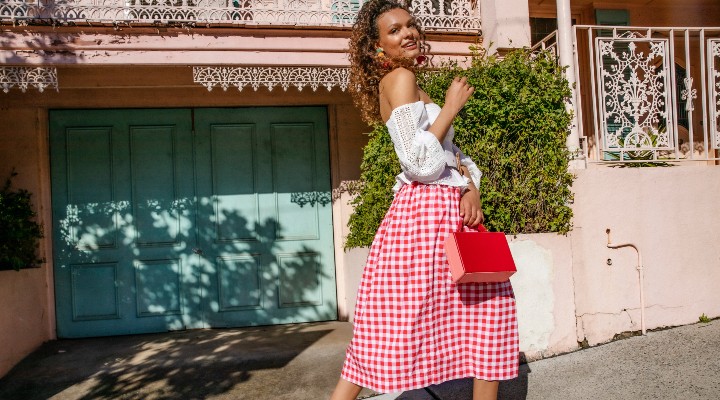From partnerships with major retailers to a slowly growing competitor landscape, rental fashion has been on the rise in recent years and now with the shift in consumer behaviour as a result of coronavirus, the category is certainly experiencing a shot of growth this year. According to Research and Markets, last year, the online rental market reached a value of US $1.26 billion. By 2025, it’s estimated to hit US $2.05 billion. “The pandemic has tightened budgets but also heightene
ghtened awareness for environmental topics, as shown by many consumer studies conducted recently. As a result, people shop in a more considered way, both from a spending and sustainability perspective,” notes sustainability strategist Anna Forster at The Purpose Agents.
“The value proposition of rental is a double-win and taps right into this shift in behavior by offering sustainable consumption on a budget.”
A fortnight ago, Rent the Runway announced it will start selling its own clothes in addition to renting it out, following on from news of its exclusive partnership with ThredUp to offer customers from the resale retailer access to Rent the Runway’s items. This is in addition to major mainstream retailers like Urban Outfitters and H&M which began dabbling in rental in the last 12 months.
Closer to home, Glam Corner just raised $12 million in series B funding – the largest amount ever received by a B Corp company.
“It’s a priority for a lot of funds to invest more in businesses that combine profit with purpose and those two things don’t have to be usually exclusive, in fact they’re self-enforcing,” says Glam Corner co-founder Dean Jones.
“Businesses like ourselves, Beyond Me and Tesla are great examples of that, where they’ve built a phenomenal product and brand and as they grow, the positive impact is magnified. That’s amazing and that’s what B Corp is all about.”
Glam Corner also just signed a partnership with David Jones, where it’s created an in-store styling hub in its Elizabeth Street flagship store in Sydney, a concept which is expected to roll out across the country in the future. Customers can book an appointment with a stylist and try on David Jones’ pieces for rental, while Glam Corner handles the rental logistics, bookings and fulfilment capabilities. Glam Corner also built a bespoke online section on the David Jones site so customers can rent items from the comfort of their own home.
“When I was setting the store up, it was late in the evening, and when I saw the Glam Corner sign for the first time, it was definitely a ‘pinch me’ moment. If you asked me eight years ago in my 30sqm room with 30 dresses that our name would be in David Jones, I wouldn’t have believed you,” says Glam Corner co-founder Audrey Khaing-Jones.
“It’s the first of its kind in Australia. Who knows how many opportunities it will unlock for rental and resale businesses?”
Meanwhile, Glam Corner’s investment boost will go towards accelerating the business, such as building a fulfilment centre at least five times the size of its current operations, which includes picking and packing, repairs, maintenance and a laundromat.
“We’ve got almost 30,000 items of clothing in our system today and we have thousands of those articles coming in and out of our fulfilment centre every day, so the system that’s being built needs to handle a magnitude more than that – tens of thousands of items per day. Everything has to be more sophisticated so we can maintain the same turnaround speed and quality,” Jones said, adding that the new centre will involve a higher degree of automation in terms of racking systems, picking and packing.
“It sounds like a battleship.”
A new ownership
From Netflix to Spotify and Uber, the sharing economy shows no slowing down in the face of coronavirus, largely driven by younger generations, says Saskia Fairfull, founder of Independent Fashion Advisory Board.
“I believe it’s a generational preference of owning versus access. Millennials seek to gain access to cult brands by wearing many pieces once, compared to generation X and baby boomers who tend to invest in pieces that will last them years,” she notes.
“Fashion rental for youths is a no-brainer in their mind and is a common way of keeping up with trends without the burden of keeping more and more things, which as fashion rental grows will become more mainstream.”
And while fashion rental is often seen as a solution to the industry’s overwhelming contribution to landfill around the globe, Fairfull points out that it’s not a cure-all.
“On the flip side, fashion rental is at risk of adding to the systemic problem of fast fashion, as it circulates low-cost garments which have little emotional value attached to the item and less care is given to prolonging a garment’s life,” she says.
“It creates even more of a negative impact on the environment through additional packaging, increased carbon emissions via logistics, increased cleaning and, inevitably, accelerating a garment’s life cycle ending up in landfill.”
However, Fairfull notes the huge opportunity for those savvy, major brands to partner with innovative e-commerce players like Glam Corner and Rent the Runway – not only to expand on their corporate responsibility initiatives, but to also deepen customer loyalty and engagement in a new way.
According to a new report from McKinsey, 50 per cent of Australians have just developed new shopping habits since the pandemic, 30 per cent have tried new brands, and more than 20 per cent have shopped with new retailer since the beginning of the year.
“A lot of people are taking stock of their consumption habits. It’s been a real reset in how they think about their wardrobes, diet and travel and they’re thinking about how in the future, maybe they can make a more positive impact,” says Jones.
“It’s great, rental’s really having its time in the sun.”

